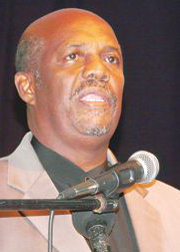
TAIPEI, Taiwan: The Opposition Leader in St. Vincent and the Grenadines (SVG) says there is “nothing strange” about economic citizenship programmes and that they attract investors to a country.
“The point is, when you establish such programmes, they must be tight and well managed,” Arnhim Eustace said on his New Democratic Party’s (NDP) radio programme on Monday.
“This is a way of attracting people to your country to make investments,” he added, stating that the United States and Canada have economic citizenship schemes.
Prime Minister Dr. Ralph Gonsalves told Parliament on Friday that his Unity Labour Party (ULP) would oppose any economic citizenship programme in SVG.
A number of Eastern Caribbean countries had embarked on the citizenship scheme but the ULP administration, shortly after coming to office in 2001, repealed the relevant laws in SVG.
Gonsalves told Parliament last week that his government is bombarded with offers for resumption of the scheme.
The NDP has promised its financier to recommence the programme if it wins the next general elections, due by March 2011, he said, adding that it will be an issue in the upcoming campaign.
But Eustace on Monday suggested that SVG needed such a programme, noting that it was “doing well” in St. Kitts and Nevis.
“In this [economic] climate that we have in St. Vincent and the Grenadines today, we can’t afford to put on any new taxes on our nationals at this time.
“People are under too much pressure right now and we have to look for avenues to raise revenue. But we have to do it in particular way,” Eustace, a trained economist said.

The former prime minister noted that the EC$913.5 million (US$338.3 million) budget for 2010, which parliament passed last week, did not include any taxes and Gonsalves had removed Value-Added Tax (VAT) on wheat and chicken.
Eustace said an NDP administration will remove VAT from all “basic food” items and would pay the fees for students taking Caribbean Examination Council (CXC) and similar examinations. (Follow I Witness-News on Facebook)
Gonsalves had told parliament that a company had written to him requesting a meeting to discuss the facilitated migration of 3,500 persons representing EC$850 million (US$313.8 million).
“Please be advised that my government has absolutely no interest in selling my country’s passport or citizenship. The highest office in our land is that of citizen, and it is not for sale. Similarly, our passport is sacrosanct and is not a tradable commodity,” Gonsalves wrote in a letter denying the request for a meeting.





